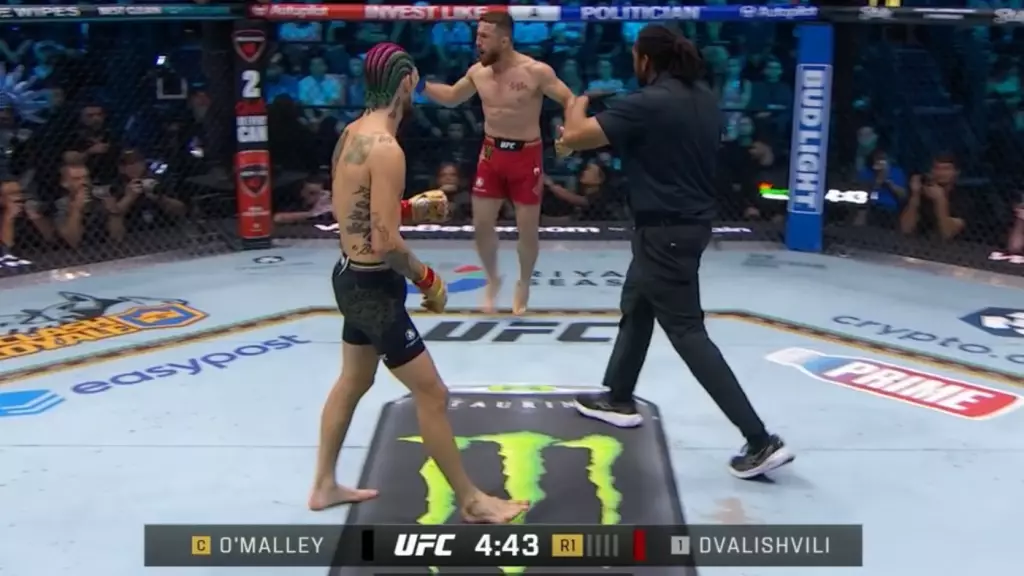The conclusion of UFC 306 in Las Vegas provided a blend of thrilling action and perplexing behavior, drawing not just attention to the event but also to the intricacies of fight preparation and in-cage conduct. The main event featured Merab Dvalishvili challenging the bantamweight champion, Sean O’Malley, in what promised to be an exciting clash between two skilled fighters. However, it was a curious incident only 10 seconds into the fight that captured the public’s imagination, revealing how mental games and coaching can affect the atmosphere inside the octagon.
Tim Welch, the head coach of Sean O’Malley, admitted that he anticipated Dvalishvili would be a formidable opponent, which could partially explain the pre-fight fervor. As the fight commenced, Welch’s loud instructions to Dvalishvili triggered an unexpected reaction that surprised many, including referee Herb Dean, who intervened to remind Welch to adhere to the rules governing coaching during a match. The interaction revealed the delicate balance coaches must maintain between encouraging their fighters and adhering to regulations against excessive communication.
War-time mental games often play a crucial role in combat sports, where psychological tactics can sometimes be as pivotal as physical prowess. Welch’s approach was meant to guide O’Malley, but it quickly devolved into confusion, showcasing how the pressure of high-stakes games can lead to outbursts that detract from the focus of the fighters. Dvalishvili was clearly agitated, responding with his own outburst as he felt disrupted by the shouts from O’Malley’s corner. This paints a vivid picture of how fighters are not only physically competing but also psychologically navigating against the tactics employed by their opponents’ camps.
The UFC’s spirit demands respect and sportsmanship amongst fighters and their camps. Dvalishvili expressed his displeasure on social media, drawing attention to the tactics he believed were unsportsmanlike. His insistence that he wished to focus solely on the task at hand was evident, even as Welch tried to explain his side of the story on a personal YouTube channel. Dvalishvili’s emotions clearly played a role, highlighting how fighters are often on edge, making them susceptible to influences that could alter their performance.
Welch acknowledged that his comments resulted in an unforeseen emotional response from Dvalishvili. Such outbursts can potentially throw an opponent off their game. However, it becomes crucial to note that they can also serve as a wake-up call to a fighter’s own mental preparedness. In this instance, Dvalishvili appeared to channel that tension into a performance that would ultimately lead him to victory. His ability to overcome that initial provocation and dominate O’Malley for the full duration of the bout shows the resilience and focus that elite fighters possess.
Despite the chaotic start, Dvalishvili demonstrated exceptional skill and tenacity throughout the fight, ultimately securing the bantamweight title by unanimous decision. This not only underscored his fighting capabilities but also pointed to the idea that initial distractions – whether caused by a coach’s attempt to energize their fighters or by external provocations – can be mitigated by composure and focus in the cage.
As viewers and analysts reflect on the drama surrounding UFC 306, it is essential to consider the broader implications of sportsmanship in professional fighting. The incident illustrates that while passionate coaching is an inherent part of the sport, there must also be respect for the opponents and a commitment to competitive integrity. Both Welch and Dvalishvili can learn from this moment, as it serves as a reminder that the stakes are not merely about winning or losing but also about how athletes conduct themselves in the public eye.
Ultimately, UFC 306 encapsulated the unpredictable nature of MMA – where physical prowess meets psychological warfare, and even minor incidents can shape the narrative of a championship bout. As the stakes rise, so will the scrutiny and analysis of behaviors inside and outside the octagon, setting the stage for a future where respect and professionalism must coexist alongside fierce competition.

